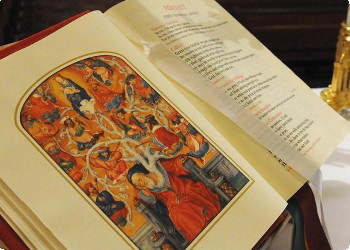BETTER FOR THAT MAN IF HE HAD NEVER BEEN BORN
Is 50,4-9a; Ps 68; Mt 26,14-25
28 MARCH
I do not know if the words of Jesus have a sense, a meaning. I do not even know if they are bearers or less of a truth, placed in them by the Holy Spirit. But I must suppose, at least on a literal level, that they have a meaning and that they are bearers of a truth, if not for us, at least for him. I say this because by now in the one, holy, catholic, apostolic Church on the one hand there is the Gospel and on the other the thought of this or that other person which is diametrically opposed. What Jesus affirms in his words, the children of the Church deny and what for Jesus is a no, for the children of the Church it is a yes. In this case it would be right at least to be honest and to say I think differently than the Gospel, by now to be relegated to a relic of archaeology along with the whole Word of God. Abolishing the Gospel also in an official way as a reference point, everyone would a free hand to affirm and to support his ideas rationally. However, in this case, one would fall from the faith and make of religion a philosophy and of philosophy a religion, each having his own philosophy and religion.
Jesus says: “The Son of Man goes away, as it is written of him; but woe to that man from whom the Son of man is betrayed! Better for that man if he had never been born”. In the Gospel according to John it is always said of Judas: “Jesus answered them, “Did I not choose you twelve? Yet is not one of you a devil?” He was referring to Judas, son of Simon the Iscariot; it was he who would betray him, one of the Twelve” (Jn 6, 70-71). “When I was with them I protected them in your name that you gave me, and I guarded them, and none of them was lost except the son of destruction, in order that the scripture might be fulfilled” (Jn 17: 2 ). If these words have a meaning and are bearers of a truth, we must conclude for the damnation of Judas and his perdition. Hell is so impossible to live, also because of its eternity, to make the damned wish for the return into nothingness, cursing the moment of their conception without ceasing. Moreover, according to the account of Peter, Judas received the death of the wicked, that is, of the godless: “He bought a parcel of land with the wages of his iniquity, and falling headlong, he burst open in the middle, and all his insides spilled out. This became known to everyone who lived in Jerusalem, so that the parcel of land was called in their language ‘Akeldama,’ that is, Field of Blood” (Acts 1: 18-19). This is the Word of Jesus and of Peter. One may not even believe, as long as he says and professes it clearly, but not by misrepresenting the Scripture, but by saying: “I do not believe in the Word either of Peter or of Jesus”. “I adore a God without the Word of Christ and without hell”.
Then one of the Twelve, who was called Judas Iscar iot, went to the chief priests and said, “What are you willing to give me if I hand him over to you?” They paid him thirty pieces of silver, and from that time on he looked for an opportunity to hand him over. On the first day of the Feast of Unleavened Bread, the disciples approached Jesus and said, “Where do you want us to prepare for you to eat the Passover?” He said, “Go into the city to a certain man and tell him, ‘The teacher says, “My appointed time draws near; in your house I shall celebrate the Passover with my disciples.”‘” The disciples then did as Jesus had ordered, and prepared the Passover. When it was evening, he reclined at table with the Twelve. And while they were eating, he said, “Amen, I say to you, one of you will betray me.” Deeply distressed at this, they began to say to him one after another, “Surely it is not I, Lord?” He said in reply, “He who has dipped his hand into the dish with me is the one who will betray me. The Son of Man indeed goes, as it is written of him, but woe to that man by whom the Son of Man is betrayed. It would be better for that man if he had never been born.” Then Judas, his betrayer, said in reply, “Surely it is not I, Rabbi?” He answered, “You have said so.”
Judas was not damned because he betrayed his Master, but because betrayal led him to despair, sinning against the Holy Spirit. But unfortunately this too is the Word of Jesus: “Therefore, I say to you, every sin and blasphemy will be forgiven people, but blasphemy against the Spirit will not be forgiven. And whoever speaks a word against the Son of Man will be forgiven; but whoever speaks against the holy Spirit will not be forgiven, either in this age or in the age to come” (Mt 12: 31-32).
Virgin Mary, Mother of the Redemption, Angels and Saints make us wisely honest.





